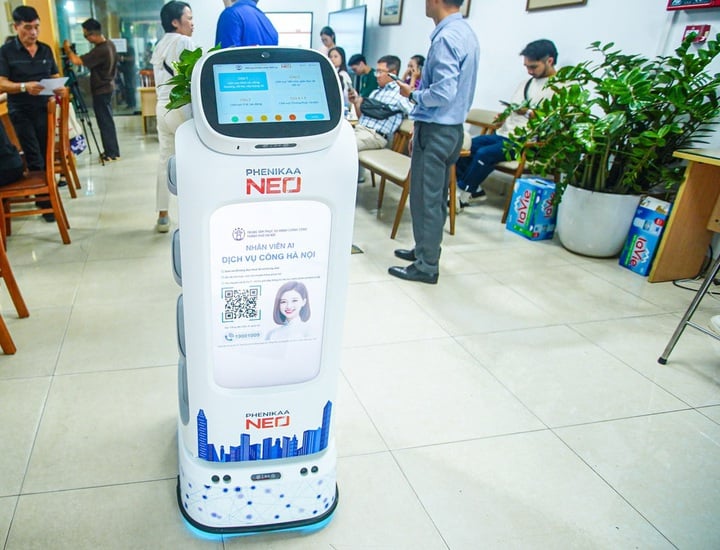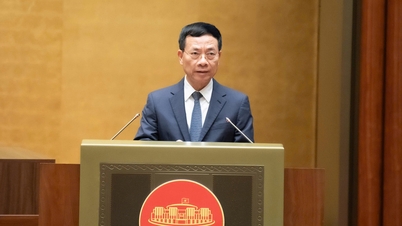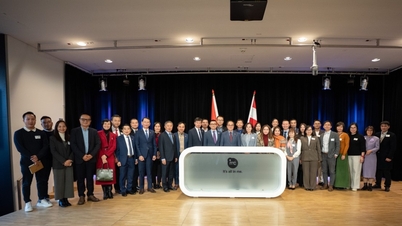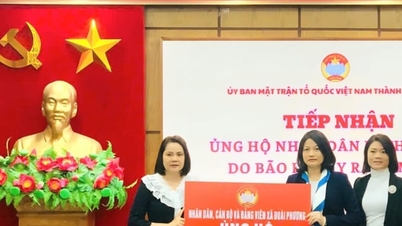New tools for two-tier local government
The recent implementation of the two-tier local government model has significantly increased the workload at grassroots units. Previously, many processes for processing records and documents still relied on manual operations and the experience of staff, so the speed of completion depended largely on individual capacity. As the workload increased, especially periodic reports and documents that had to be processed within the day, the pressure on time and accuracy became evident.
Since the two-level local government model officially came into operation, Giang Vo ward ( Hanoi ) has recorded a significant increase in the number of records, documents, and reports that officers have to process every day. In that context, AI is expected to be a powerful support tool, helping to reduce manual work, shorten processing time, and provide faster and more accurate suggestions to users.
Mr. Tran Viet Phuong, a civil servant of the Ward's Department of Culture and Society, shared: "When using AI tools, legal issues are something that makes me very concerned. For example, what actions are allowed, what actions are restricted; what information is accessible, what information is not allowed to be accessed; or ensuring the accuracy of information is also something that is difficult to control if completely dependent on AI tools."

AI staff working at the Cua Nam Ward Public Administration Center. (Image source: collected)
These concerns prompted the Giang Vo ward authorities to organize a specialized training course on the application of AI in public administration. The course not only introduced the concept and common types of AI tools, but also guided officials in practicing on specific situations related to their daily work.
The training content includes many parts: from an overview of AI, how to set commands for AI to answer accurately, to skills to verify information provided by AI. Some sessions also give time for staff to practice entering data, requesting AI to synthesize reports or draft documents according to templates, then compare the results with current legal regulations.
Head of the Department of Culture and Society of Giang Vo Ward, Pham Thanh Ha, commented: "When based on the practical capacity of civil servants and the advice of the AI system, the consultation will be more accurate and precise according to the provisions of current law. Because the speed of the document changes too much and if you read and understand, there is no time. This is a very urgent requirement."
The training sessions also helped officers realize that AI is just a supporting tool and cannot completely replace the human factor. Experience, legal knowledge and the ability to handle situations are still the decisive factors for the final results to be accurate and valid.
Security challenges and training requirements
According to Lawyer Nguyen Danh Hue , AI operates on an online infrastructure, and input data can be stored and processed on servers outside the country. This poses a risk of information leakage, especially data that is state secrets, official secrets, or sensitive personal data. "It is especially serious if officials and civil servants are not aware of this level of danger, which can lead to violations of the law. The highest risk is that information and state secrets will be disclosed if not properly protected according to regulations, thereby causing damage to the State and affecting national security," the lawyer warned.
Not only security risks, another issue is the accuracy of information provided by AI. AI produces results based on trained data, which is not always updated or complete. In the public administration environment, incorrect information can lead to incorrect documents, wrong decisions, directly affecting the rights of the people.
Master Nguyen Thai Minh, an AI training expert, said that AI always has two sides. Although AI can support many heavy jobs and tasks, there are also negative aspects related to data, when the results that AI creates are not necessarily completely accurate. Therefore, civil servants and public employees need to be thoroughly trained to raise awareness of the risks when using results created by AI in the process of applying them to work.
Therefore, training requirements do not only stop at helping staff know how to use AI, but also help them understand the operating principles of this tool, identify legal limits, know how to classify which information is allowed to enter the system and which information is absolutely not. At the same time, staff also need to be proficient in cross-verification skills from multiple sources to verify the accuracy of data.
Implementing a two-tier local government model requires a generation of civil servants and public employees with new thinking, flexible capacity and the ability to multitask. Realizing this requirement, administrative human resource training institutions have proactively adjusted their curricula towards specific subjects, such as: AI skills, AI knowledge; digital transformation skills and digital technology, etc.
Currently, Vietnam does not have a separate law to manage AI research and application activities. While waiting for the legal framework to be completed, each agency and unit needs to proactively set up "fences" to protect data, while strictly complying with current regulations on information security. Technology experts affirmed: "When the State issues legal documents clearly stipulating the areas and contents in which civil servants are allowed or not allowed to manipulate and use AI tools, the data of the State as well as of the people will be absolutely safe."
The story at Giang Vo ward shows that when officials are equipped with both knowledge and skills in using AI, this technology can help them give quick advice, process documents promptly and ensure compliance with the law. However, it also reminds that AI is just a tool and the user is the decisive factor in ensuring the quality and legality of the final result.
The effectiveness of AI in public administration depends on the close combination of a clear legal framework, a secure governance mechanism, a systematic training system and the security awareness of each staff member. This is the foundation to help improve work efficiency, reduce manual pressure and improve the quality of service to the people, while minimizing the potential risks from the negative side of this technology./.
According to the Economic and Urban newspaper.
Source: https://mst.gov.vn/ai-trong-hanh-chinh-cong-co-hoi-but-pha-va-rui-ro-19725101919002315.htm


![[Photo] Closing Ceremony of the 10th Session of the 15th National Assembly](/_next/image?url=https%3A%2F%2Fvphoto.vietnam.vn%2Fthumb%2F1200x675%2Fvietnam%2Fresource%2FIMAGE%2F2025%2F12%2F11%2F1765448959967_image-1437-jpg.webp&w=3840&q=75)


![[Photo] Prime Minister Pham Minh Chinh holds a phone call with the CEO of Russia's Rosatom Corporation.](/_next/image?url=https%3A%2F%2Fvphoto.vietnam.vn%2Fthumb%2F1200x675%2Fvietnam%2Fresource%2FIMAGE%2F2025%2F12%2F11%2F1765464552365_dsc-5295-jpg.webp&w=3840&q=75)

































































































Comment (0)